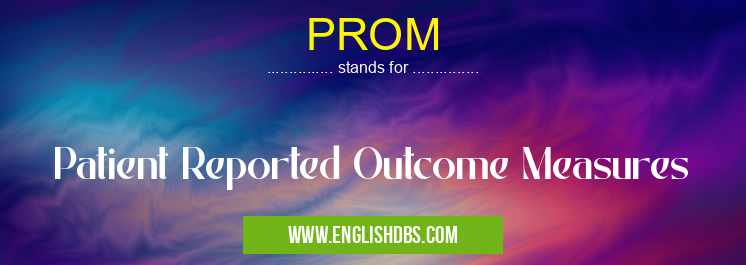What does PROM mean in GOVERNMENTAL
PROM stands for Patient Reported Outcome Measures, which are subjective reports provided by patients about their health status, symptoms, and experiences. PROMs assess outcomes that matter most to patients and can complement traditional objective measures such as laboratory tests or physical exams.

PROM meaning in Governmental in Governmental
PROM mostly used in an acronym Governmental in Category Governmental that means Patient Reported Outcome Measures
Shorthand: PROM,
Full Form: Patient Reported Outcome Measures
For more information of "Patient Reported Outcome Measures", see the section below.
Introduction: PROM Meaning and Significance
PROMs are integral to patient-centered care, empowering patients to participate actively in their health management and enabling healthcare professionals to tailor treatments based on individual patient values and preferences.
Types of PROMs
PROMs can be categorized into several types based on the aspect of health they measure:
- Symptom Measures: Assess the severity and frequency of specific symptoms experienced by patients.
- Functional Status Measures: Evaluate patients' ability to perform daily activities and their impact on quality of life.
- Psychological Measures: Measure patients' emotional well-being, mental health, and coping mechanisms.
- Health-Related Quality of Life Measures: Assess patients' overall perception of their health and its impact on their daily lives.
Benefits of PROMs
- Improved Patient-Provider Communication: PROMs provide a structured framework for patients to communicate their experiences and concerns.
- Patient-Centered Care: PROMs enable healthcare professionals to tailor treatments based on patient-specific goals and priorities.
- Enhanced Patient Engagement: PROMs empower patients to be active participants in their own care and increase their satisfaction with treatment plans.
- Treatment Monitoring: PROMs allow healthcare professionals to track treatment progress and identify areas where adjustments may be needed.
- Research and Evaluation: PROMs contribute to clinical research and the development of new therapies by providing patient-reported data on outcomes.
Conclusion: The Value of PROMs
Patient Reported Outcome Measures (PROMs) play a crucial role in patient-centered healthcare. By capturing patient-reported data on health outcomes, PROMs improve communication, enhance treatment planning, engage patients, monitor progress, and contribute to research. The use of PROMs is essential for delivering high-quality healthcare that aligns with patient values and priorities.
Essential Questions and Answers on Patient Reported Outcome Measures in "GOVERNMENTAL»GOVERNMENTAL"
What are Patient Reported Outcome Measures (PROMs)?
PROMs are standardized questionnaires or surveys that assess patients' perspectives on their health condition, treatment, and quality of life. They provide valuable insights into the patient's experience and outcomes, which are not always captured by traditional clinical measures.
Why are PROMs important?
PROMs are important because they:
- Enhance communication between patients and healthcare providers.
- Identify areas where patient care can be improved.
- Provide a more comprehensive understanding of treatment effectiveness.
- Contribute to patient-centered care and decision-making.
What types of PROMs are commonly used?
There are various types of PROMs available, including:
- Generic PROMs: Assess general health outcomes applicable to various conditions.
- Condition-specific PROMs: Focus on specific health conditions and symptoms.
- Treatment-specific PROMs: Measure outcomes related to a particular treatment or intervention.
How are PROMs different from clinical outcome measures?
PROMs differ from clinical outcome measures in that:
- PROMs assess patient-reported experiences and perceptions.
- Clinical outcome measures typically focus on objective, measurable physiological parameters.
- Both PROMs and clinical outcome measures provide complementary information for a comprehensive evaluation of patient outcomes.
How are PROMs used in healthcare?
PROMs are used in healthcare for various purposes, including:
- Monitoring patient progress and recovery.
- Evaluating the effectiveness of treatments and interventions.
- Identifying patient needs and preferences.
- Informing shared decision-making between patients and providers.
Are PROMs reliable and valid?
The reliability and validity of PROMs vary depending on the specific instrument used. However, many PROMs have undergone rigorous testing and validation processes to ensure they provide accurate and consistent results.
PROM also stands for: |
|
| All stands for PROM |
